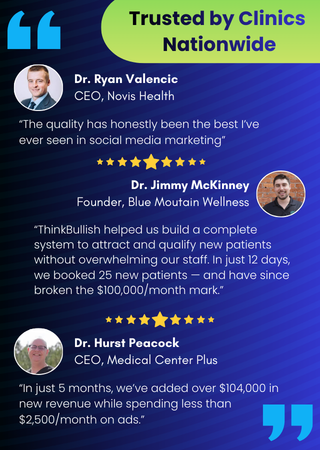In a competitive field like knee decompression, dominating the market is something every practitioner aims for.
But what does it really mean to dominate the market?
It means establishing a name for your practice in such a way that it becomes the go-to choice for knee decompression treatments, attracts a steady stream of patients, and outshines the competition.
Now, let me pose a question:
Do you know that SEO can play an integral role in helping you achieve market dominance in knee decompression?
Search Engine Optimization (SEO) is the essence of a strong online presence in the digital age. It can make the difference between being buried beneath the competition and rising to the top of search engine results.
In this blog post, I am uncovering the key SEO strategies that will drastically improve your knee decompression marketing to dominate the market. Whether you’re an established practitioner or just starting, these strategies will put you on the path to success.
Optimizing Your Website for Knee Decompression Marketing Dominance
Today, we live in a digitally revolutionized world where your website acts as the primary source for potential patients to discover you and learn about your services. Your website is not just a nook in online space; rather, it is an integral part of your knee decompression marketing and plays a pivotal role in your SEO strategy. A well-optimized website can be the driving force for a competitive edge.
A website that is thoughtfully designed, gives a seamless user experience, and is loaded with valuable content ranks higher on search engines like Google. A higher ranking on search engines means potential patients are more likely to find your practice when they search for knee decompression treatments.
Here are a few strategies that can optimize your website for search engines.
Keyword Integration: While writing copy and content for your website, make sure that you incorporate keywords and do so in such a way that it looks organic and natural.
High-Quality Content: Make sure that you keep updating your website with high-quality content such as blog posts, articles, the latest developments, and patient feedback. The more valuable content your website offers, the more attractive it appears to visitors and search engines.
Mobile Responsiveness: Though you primarily do that to ease your users, optimizing your website for smartphones and various devices also favors search engine algorithms.
Loading Speed: Make sure that your website loads up quickly. This is important because slow-loading pages can result in a high bounce rate, which negatively impacts SEO.
Optimize Meta Tags: To enhance your search engine visibility, craft relevant meta titles and descriptions with targeted keywords.
Ensuring all the elements mentioned above work properly on your website not only improves your search engine visibility but also creates a seamless user experience, which of course, is one of the ways to dominate the market.
If you want professional assistance, consider availing yourself of the services of an experienced SEO expert specializing in healthcare and medical practices. Consider my agency, Think Bullish. My teammates and I can help tailor your SEO strategy to the unique needs of your knee decompression practice. Schedule a discovery call here to learn more.

Keyword Research
Thorough keyword research is the nub of effective SEO. It is all about identifying words and phrases that potential patients use when they search for knee decompression treatments. Every piece of content of your knee decompression marketing material should be enriched with these keywords, but in a way that seems natural. Whether it is your home page, blogs, or service description pages, they all should be laden with relevant keywords.
So, the gist is that to dominate the knee decompression market, you must begin by discovering and utilizing the right keywords. But what exactly does this entail?
Understanding User Intent: Your keyword research starts by putting yourself in the shoes of your potential patients and thinking about what they could possibly type in the search bar when they look for knee decompression treatments. Are they searching for “non-surgical knee pain relief” or “top knee decompression clinic near me”? Understanding the intent behind these queries is key to your success.
Competitor Analysis: Another great yet often overlooked strategy that you can adopt is to conduct a competitor analysis and see what keywords are used by them. You can use tools like SEMrush and Ahrefs that can reveal their keyword strategies. This can provide insight and identify keyword gaps.
Local vs. Global Keywords: If you’re targeting a local knee decompression market, focus on local keywords. For instance, “best knee decompression clinic in [your city].” For a broader audience, aim for more general keywords.
Now, let’s get practical. Consider using these keywords for your knee decompression marketing:
Local Keywords:
“Top knee pain relief clinic near me”
“[Your City] knee decompression specialists”
“Non-surgical knee treatment [your area]”
“Knee decompression [your city]”
Service Keywords:
“Knee decompression for osteoarthritis”
“Knee decompression therapy”
“Knee pain relief without surgery”
“Non-invasive knee decompression”
Educational Keywords:
Is knee decompression right for me?”
“How does knee decompression work?”
“Knee decompression vs. surgery”
“Understanding Knee Decompression”
This broad spectrum of keywords addresses the various intentions of potential patients, whether they’re looking for local solutions, detailed information, or a specific service. By incorporating these keywords strategically into your website and content, you’re positioning yourself to dominate the knee decompression market.
Using Google Trends to Improve SEO Strategy
When you want to dominate the market with your SEO strategy, you must stay at the forefront of trends and user interests. While using traditional keyword research tools is important, you must also add Google Trends to improve your keyword research and, ultimately, your SEO strategy. Google Trends is a dynamic and real-time tool that can supercharge your SEO strategy.
Using traditional keyword research tools gives you historical data, showing you what users have searched for in the past. Whereas, Google Trends offers an up-to-the-minute view of search trends, providing insights that can help you tailor your content and strategies for the present moment. It also shows you when specific keywords or topics are experiencing spikes in searches. This real-time data can give effective cues for your content creation strategy, allowing you to make the most of what’s trending in knee decompression marketing.
As we are talking about dominating the market, Google Trends can greatly help you with that. It provides insights into regional variations in search trends. You can refine your content and SEO strategy to cater to the specific interests and needs of your local audience.
Quality Content Creation for Effective SEO
The most powerful and result-driven strategy to improve your SEO is to create high-quality, informative, and engaging content. To do that, you must maintain a regular schedule of publishing blog posts, articles, and videos related to knee decompression, knee health, and related topics. Share patient success stories and valuable insights. Google rewards fresh, relevant content with higher search rankings.
Quality content isn’t just about engaging your audience; it’s also a potent tool for SEO domination. Google’s algorithms are increasingly favoring great quality and relevant content.

On-Page SEO & Local SEO
To improve your SEO strategy, it is imperative to optimize your website’s on-page elements. This involves using your keywords in headings, content, and image alt tags. You can also use internal and external links to connect your content to authoritative sources and other relevant pages on your website. Readability and structure often come under the design category, but to make sure that your user gets a seamless experience, pay attention to the readability of your content and its structure.
Local SEO is crucial for attracting patients in your area. Claim and optimize your Google My Business listing. Ensure your name, address, and phone number (NAP) are consistent across all online directories and platforms. Encourage satisfied patients to leave reviews, which can positively impact your local search rankings.
Also, read: Social Proof: Harnessing Patient Success Stories for Knee Decompression Marketing
Mobile Optimization, Link Building & Website Speed
While you may think about keywords and your content as the core component of your SEO strategy, there are other intricate aspects that can greatly impact your rankings. These important yet often overlooked aspects include: optimizing your site for different devices, link building, and improving website loading speed.
A major portion of your web traffic comes from mobile devices. Ensure your website is mobile-friendly, as Google prioritizes mobile-friendly sites in its rankings. A responsive design and quick load times are essential for mobile optimization.
Backlinks, or incoming links from other websites to yours, are an integral part of your SEO exercise. Backlinks that are of high quality and are derived from reputable sources can boost your search rankings significantly. While pursuing your knee decompression marketing, you can consider connecting with other healthcare practitioners, publishing guest posts, and effectively engaging with your community to earn backlinks.
Your website loading speed is also important and can affect your SEO success. You have to make sure that your website loads up quickly. Contrarily, when a visitor lands on your site, and it takes time to load, it makes them bounce back to other sites and impacts your rankings.
A fast-loading website is crucial for SEO success. Slow-loading sites can deter visitors and negatively impact your rankings. Additionally, ensure your site is secure with an SSL certificate, which not only provides security but also enhances SEO.
Monitor and Analyze
If you aim to dominate your market through knee decompression marketing, you must consider monitoring and analyzing your SEO strategies. You need to see whether you are moving up in the rankings or not. Is your organic traffic increasing? These insights are important to refine your strategy. Also, with effective monitoring, you can ensure you’re aware of algorithm changes and adapt your strategies to stay on top.
There are several ways in which you can monitor and analyze your SEO strategy, such as:
Keyword Ranking Tools: A great way to gauge your performance is through tools like Moz or SEMrush. These tools are incredible and give you insights on your keyword rankings regularly. They also provide insights into competitors’ rankings.
Google Analytics: This free tool is invaluable for tracking organic traffic, user behavior, and conversion rates.
Backlink Analysis Tools: Tools like Ahrefs can help you monitor your backlink profile and identify potentially harmful links.
Competitor Analysis Tools: Tools such as SpyFu allow you to analyze competitors’ SEO strategies and gain insights for your own.
Regular Audits: Perform site audits to identify technical issues, page speed problems, or broken links that may affect your rankings.
By monitoring and analyzing these key aspects, you’ll be better equipped to fine-tune your SEO strategy, stay ahead of competitors, and ultimately dominate the knee decompression market.
Stay Informed and Adapt
The field of SEO keeps on evolving. To succeed and maintain the effectiveness of your SEO strategy, your knee decompression marketing team must stay abreast with the latest information, trends, tools, and algorithm updates. Stay informed and adapt your SEO strategies accordingly to maintain your position at the top of the knee decompression market.
Wrapping Up
By incorporating these SEO strategies in your knee decompression marketing plan, you can easily rule over your target market, reach out to more patients, and serve those who need your services. While these strategies are tested and give you results, it is important to remember that SEO is a long-term game, and it takes time to witness notable results. However, the benefits in terms of attracting new patients and growing your practice are well worth the effort.
Want to stand out in the knee decompression market? Start implementing these SEO strategies today, and watch your practice soar to the top of search engine results. Avail services of my specialized agency, Think Bullish. Schedule a discovery call here to know everything we can do for your practice.
FAQs
Is SEO a long-term commitment, and when can I expect results?
SEO is indeed a long-term strategy. It takes time for search engines to recognize and rank your content. Results can vary but generally start becoming evident within 3-6 months, with substantial progress visible over 6-12 months.
What are the most common technical issues affecting SEO?
Common technical SEO issues include page load speed, mobile-friendliness, indexing problems, and broken links. Regular site audits and tools like Google’s PageSpeed Insights can help identify and resolve these issues.
How often should I revisit and update my SEO strategy?
Regularly reviewing and updating your SEO strategy is essential. Search engine algorithms change frequently, and your competitors evolve. Aim to revisit and adjust your strategy every 3-6 months.
What are the most common SEO mistakes to avoid?
Common SEO mistakes include keyword stuffing, ignoring mobile optimization, neglecting technical issues, using duplicate content, and not focusing on user experience. Avoiding these pitfalls is crucial for successful SEO.

Zack Siegel
Founder/CEO
Zack is a conversion rate lover and PPC ad man spending most of his time optimizing.
He’s an avid bookworm, Chipotle’s most valued customer, and pursuant stand-up comedian…
We give him reality checks every day.





